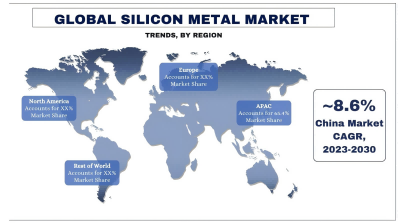-
Give us a call +86 -755-25432352
-
Email us info@urbanmines.com
-
Come & visit us Block A, FuHai Technopark, HuaFeng Smart Valley, YongFu Rd, BaoAn,Shenzhen,China
Give us a call +86 -755-25432352
Email us info@urbanmines.com
Come & visit us Block A, FuHai Technopark, HuaFeng Smart Valley, YongFu Rd, BaoAn,Shenzhen,China

The international market for silicon metal continues to decline. China, which accounts for about 70% of global production, has made it a national policy to increase production of solar panels, and demand for polysilicon and organic silicon for panels is growing, but production exceeds demand, so the price decline is unstoppable and there is no new demand. Market participants believe that overproduction will continue for a while and that prices may remain flat or may even decline gradually.

The export price of Chinese silicon metal, which is an international benchmark, is currently around $1,640 per ton for grade 553, which is used as an additive for secondary aluminum alloys and polysilicon, etc. It has fallen by about 10% in three months from around $1,825 in June. Grade 441, used in large quantities for polysilicon and organic silicon, is currently around $1,685, down about 11% from June.
According to non-ferrous metal trading company Tac Trading (Hachioji, Tokyo, Japan), China's production of silicon metal in January-August 2024 is about 3.22 million tons, which is about 4.8 million tons on an annualized basis. The company's chairman, Takashi Ueshima, said, "Given that production in 2023 was about 3.91 million tons, this is likely a large increase in production to expand the production of solar panels, which is considered a national policy." Demand for 2024 is expected to be 1.8 million tons per year for polysilicon for solar panels and 1.25 million tons for organic silicon. In addition, exports are expected to be 720,000 tons, and domestic demand for additives to secondary aluminum alloys is expected to be about 660,000 tons, for a total of about 4.43 million tons. As a result, there will likely be an overproduction of just under 400,000 tons. As of June, inventory was 600,000-700,000 tons, but "it has probably increased to 700,000-800,000 tons now. The increase in inventory is the main reason for the sluggish market, and there are no factors that will cause the market to rise shortly." "To gain an advantage in the world with solar panels, which are a national policy, they will want to avoid a shortage of raw materials. They will continue to produce polysilicon and the metal silicon that is its raw material," (Chairman Uejima). Another factor in the price drop is the increase in companies in China that manufacture grades "553" and "441," which are raw materials for polysilicon, due to the expansion of solar panel production. Regarding future price movements, Chairman Uejima predicts, "Amid overproduction, there are no factors that will cause an increase, and it will take time to balance supply and demand. The market may remain flat or gradually decline in September and October."